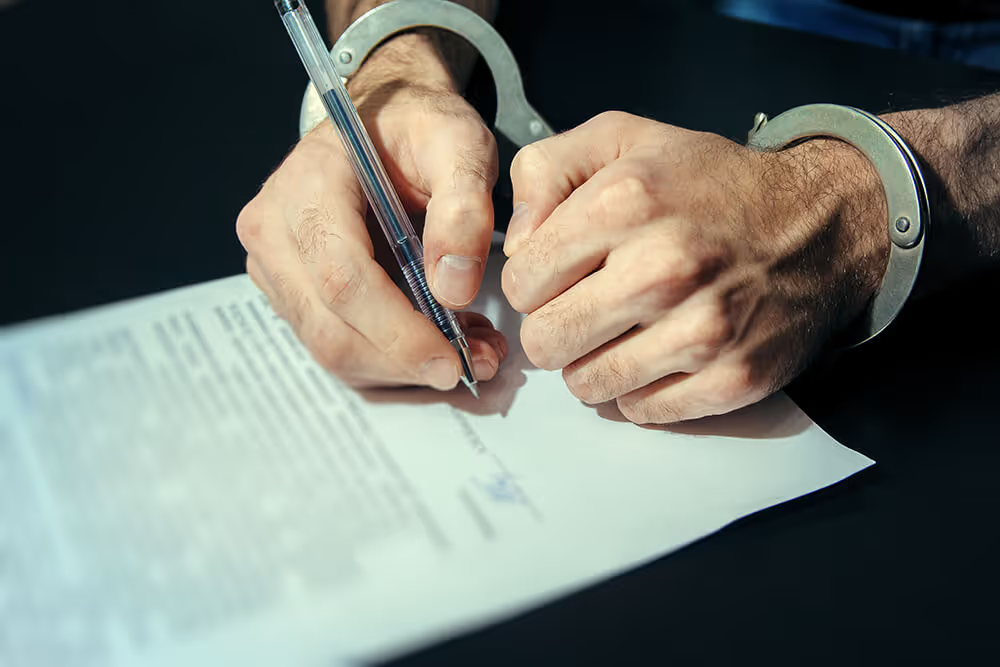Confession Evidence in the UK


Few forms of evidence carry as much weight in criminal proceedings as a confession. When someone admits to wrongdoing, it can appear to settle the matter at once.
Yet, confession evidence in the UK is far more complex than it seems. While an admission can speed up a case and even resolve it without a trial, there is a darker side. The primary consideration here is what is known as a coerced confession.
Public awareness has grown in recent years about the risks of unreliable statements made in police interviews. Stories of people pressured into saying things they did not mean, or cases overturned after decades due to false confessions, have raised serious concerns.
The law has responded by putting more safeguards in place, including the requirement for legal protection under caution and strict rules about when and how confessions can be admitted as evidence.
So, what qualifies as a legal confession? In this article, the experts at Holborn Adam will explain what counts as a confession in UK law and how the courts decide what can be used. We will also highlight the protections available to suspects, the admissibility of confessions in the UK, and the important role of early legal advice.
What Counts as a Confession in UK Law?
Under UK law, a confession is any statement made by a person that is wholly or partly adverse to them. This is regardless of whether it was made to a person in authority, in words, or through other means such as gestures or conduct.
Confessions can include any statement that admits guilt or acknowledges facts that suggest guilt. It does not need to be a dramatic admission like “I did it.” A casual comment, a written note, or even an indirect remark such as “I was there, but I didn’t mean for it to happen” can all be treated as confessions. These statements can be made to the police, to investigators, or to anyone in a position of authority.
The context and wording of confessions are very important. For instance, a poorly chosen phrase might be taken as an admission when the speaker intended something completely different. It is the job of the court to assess the weight of the confession by looking at the circumstances under which it was made. An ambiguous comment might carry little evidential value, but a clear and voluntary statement can become central to the case.
The Legal Framework Governing Confession Evidence
In the UK, confessions are regulated mainly by the Police and Criminal Evidence Act 1984 (PACE). Section 76 of PACE says that a confession is inadmissible if it was obtained through oppression or in circumstances that make it unreliable. Section 78 gives judges discretion to exclude evidence if admitting it would have an unfair effect on the trial.
For a confession to be admissible, it must be both voluntary and reliable. This protects suspects from being convicted based on words extracted through pressure, threats, or manipulation.
One of the most important safeguards is the requirement that police give a formal caution before an interview.
“You do not have to say anything, but it may harm your defence if you do not mention when questioned something which you later rely on in court. Anything you do say may be given in evidence.”
This is a reminder to suspects of their legal protection under caution. It is intended to highlight both their right to silence and the potential consequences of speaking.
PACE is further supported by Codes of Practice that guide how police interviews must be conducted. These include rules about recording interviews, access to legal advice, and the treatment of vulnerable suspects. The framework is designed to make sure that confessions are not only useful to the police but also fair to the accused.

The Problem of Coerced or Unreliable Confessions
Despite confession safeguards, problems still occur. A coerced confession can happen when a suspect is placed under psychological pressure, subjected to long hours of questioning, or intimidated by authority. Fatigue, fear, or a desire to end the ordeal may lead someone to say things that are not true.
It is likewise important to note that some suspects are more vulnerable than others. Indeed, young people, those with mental health conditions, or individuals with limited English skills may not fully understand what is happening during police interviews in the UK. They may be more likely to agree with suggestions, misunderstand questions, or make admissions without realising the consequences.
There are also a number of interrogation techniques that can “cross the line” in terms of producing false confessions. These include leading questions, repeated interviews without breaks, or isolating a suspect from support. Well-known cases, such as the Birmingham Six and the Guildford Four, both revealed how unreliable confessions can contribute to wrongful convictions.
Modern research continues to highlight the risk, with studies showing that false confessions are a factor in many overturned convictions. Because of these risks, UK law treats coercion very seriously. A confession obtained unfairly is likely to be excluded, no matter how persuasive it seems.
Police Interviews in Practice
When a suspect is interviewed under caution, the process is supposed to follow a clear structure. As noted, the suspect’s rights should be explained at the outset, including the right to silence and the right to legal advice. Interviews are usually audio- or video-recorded to preserve accuracy and prevent disputes about what was said.
Even so, many suspects misunderstand the process. Some think cooperating fully means answering every question, while others believe silence will automatically protect them. The reality is more complex. Saying too much without guidance can create damaging admissions, while saying too little may allow the court to draw negative inferences later.
This is why legal advice is so important during UK police interviews. A solicitor can guide you on whether to answer, remain silent, or provide a prepared statement. Without this help, even an innocent person can fall into traps.
How Do Courts Evaluate Confessions?
When deciding whether to allow a confession into evidence, the courts will generally ask several key questions, including:
- Was the confession voluntary?
- Was it obtained in compliance with PACE and the Codes of Practice?
- Could external factors such as fear, encouragement, or oppressive tactics have made the statement unreliable?
The burden is on the prosecution to prove that the confession is admissible. If the defence raises concerns about how it was obtained, the judge must consider whether admitting it would be fair. If certain criteria are met regarding the conditions of the interview or the state of the suspect, defence solicitors may argue that a confession should be excluded.
Confessions can be used as primary evidence, meaning they stand as proof of guilt. They can also be used as corroborative evidence, where they support other material. Either way, courts should always treat them with caution because of their potential impact on the outcome.
Should You Ever Confess?
Whether to make admissions in an interview is a complex question. In some cases, a limited confession may help secure an out-of-court disposal, such as a caution. This can help you avoid prosecution.
But there are risks. For instance, a “partial confession” may be taken out of context and used against you, even if you did not intend to admit guilt.
Remember that there are safeguards to protect suspects during interviews. The right to remain silent and to consult a solicitor are chief among these. Seeking appropriate legal representation can help you balance the need to cooperate with the police against the need to protect your rights.
The Role of Precharge Legal Representation
Early intervention can be decisive. A solicitor can step in before interviews to set boundaries, ensuring that questioning remains fair. They can advise you on whether to answer questions, stay silent, or provide a prepared statement. This guidance helps protect against coercion and ensures that any statement made is accurate and legally strategic.
Precharge representation is not just about defending in court. It is about shaping the case before it gets that far. By presenting evidence, challenging weak allegations, and protecting clients during questioning, solicitors can often prevent charges from being filed at all.
At Holborn Adams, we have extensive experience dealing with cases where confession evidence plays a central role. Our team understands how damaging admissions can be, especially if they were made under pressure. Fortunately, we are highly skilled at challenging unlawful or coerced confession statements, often securing outcomes that protect our clients before matters reach court.
Remember, the best protection is early legal advice. When your future is at stake, you need experts who understand both the law and the tactics used in interviews. That’s Holborn Adams.




